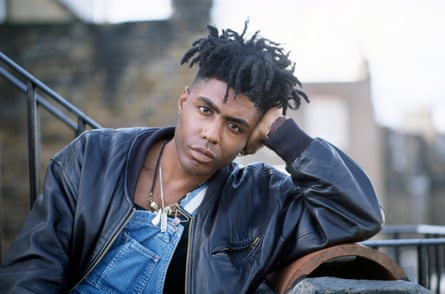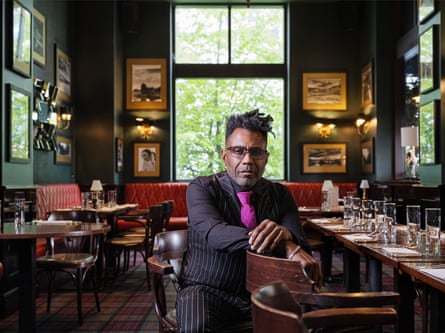Omar’s fans are united in believing that he’s a genius that should have been a superstar. “The undisputed architect of what we now know as neo-soul”, goes one YouTube comment, acknowledging that the British musician’s albums predate the genre’s US benchmarks such as D’Angelo’s Brown Sugar and Erykah Badu’s Baduizm. Another: “Really don’t know why Omar didn’t go on to be big worldwide.” And then: “D’Angelo was the closest they [America] had to someone of Omar’s calibre and even he pales in comparison from a wholly musical standpoint.”
“That’s dangerous talk!”, the musician laughs when I relay the last quote back to him. But 40 years into his career, he’s proud of his musical legacy. “When I started out at 14, I said I wanted to make music that, as soon as you hear the first four bars, you know it’s me,” he says. “I think I’ve achieved that.” His other goal? “To make pure bangers.”
Born Omar Lyefook, the 56-year-old is an MBE-decorated multi-instrumentalist, producer, songwriter and sublime singer, who has scored a musical and acted in EastEnders. Stevie Wonder wanted to write a No 1 for him, and he’s worked with the neo-soul era’s US greats, including Badu, Common, Jill Scott and the late Angie Stone. While he may not have their profile, he’s put out music since the mid-80s and his importance is acknowledged not just by YouTube commenters but by successive generations of tastemakers and artists, from livestreaming sensation DJ AG – who recently did a pop-up gig with Omar outside a London McDonald’s – to Children of Zeus. As Konny Kon of that Manchester neo-soul duo puts it: “Omar is a national treasure who laid the foundations. His production should be recognised just as much as his vocals.”
I meet Lyefook at the Canary Wharf outpost of plush restaurant chain Boisdale, where he’s playing with supergroup the British Collective. Their website’s no-messing mission statement: “to put the soul back into British R&B and keep it there.”

“I live in a world where Prince, Michael Jackson, Whitney Houston are still alive,” says Lyefook, and he’s not just feeling nostalgic because of music. “There’s certain things about this era where I’m like, can we rewind? All this madness with Trump, the wars …” He pauses. “It’s a lot to get into. I’m just a vibes man.”
That’s modest. Lyefook longs for unity on his optimistic ninth studio album Brighter the Days, a self-described magnum opus over 18 tracks, originally born of lockdown frustration. “I’m closer to the end than I am the beginning, and I refuse to be negative about stuff,” he says. “I need to find the good in everybody.” In person, he’s exceptionally down-to-earth but on record, he has a supernatural gift for blending genres like funk, jazz, samba, hip-hop and salsa, and on Brighter the Days, he turbo-charges this with lush strings. There’s plenty of transatlantic guests, too, plus others closer to home in Brighton – namely his teenage twin daughters. “I had to pay them proper rates. £200!”
Lyefook grew up in a musical family in Kent: those Latin influences could have subconsciously come from his Cuba-born grandmother, his Chinese-Jamaican father is a reggae drummer who put out his son’s first singles on his label, and his siblings are all musicians. He was classically trained at Guildhall School of Music and Chetham’s, and his first professional gig was playing percussion with Paul Weller’s Style Council in Japan in 1989. Weller offered his studio for Brighter the Days and played on the track On My Own. “That dude had [about] five albums out in one year” recently, Lyefook jokes. “It took me seven to get one out.”
His breakout moment was in 1990 with There’s Nothing Like This – and at the time, there really wasn’t. Riffing on Ohio Players’ Heaven Must Be Like This, the gently sinewy soul-jazz ballad detailed a romantic night in, over a seriously memorable groove. “I just pictured a fireplace, a rug … Fuck knows what ‘champagne wine’ is,” he hoots. The song and album of the same name each went Top 20 when they were rereleased on Norman Jay and Gilles Peterson’s Talkin’ Loud label a year later.
Lyefook fondly recalls that time: the acid-jazz explosion, driving his Saab convertible around London clubs and getting his trademark eyebrow piercing. But while he earned the respect of critics, execs at the major label that owned Talkin’ Loud offered less support. “Norman and Gilles being DJs, they’re into the music. The higher ups, they’re not,” he explains “They’d say, ‘there’s no budget for videos’, but then they’re giving budgets to all the rock acts.” Those execs asked for his string sections to be played on synths, “so we don’t have to pay the musicians. Then Jason Donovan had a song out on the same label and he’s got the exact same string section I was using.”
His subsequent albums didn’t break him in the US, despite cameos such as Wu-Tang Clan’s Ol’ Dirty Bastard who was enlisted on 1997 track Say Nothin’ for “10 grand, two hookers and a bottle of Baileys,” laughs Lyefook. “I had nothing to do with it!” Meanwhile, in the UK, “it was one in, one out”. An A&R told his manager: “‘We don’t need Omar, we’ve got Craig David.’ It doesn’t matter where I go, there’s something stopping me from getting that attention.” But he doesn’t like to dwell on it. “If I wasted time thinking about that then it might affect my creativity.”
Lyefook has released plenty of albums in the following years, and his track It’s So, a euphoric Afrobeat-style shuffle, has endured in DJ sets since it first lit up dancefloors in 2004. He’s rarely stopped gigging, yet he hasn’t put out an LP since 2017. Instead, there have been forays into acting: in 2022, he was on Albert Square for a two-week stint playing Avery Baker, estranged brother of Mitch Baker. “When they showed me the part, it’s a dude who wears a three-piece suit, smoking a cigar, driving a Bentley and playing the piano in the pub.” So not that far from real life? “Exactly. I was like, ‘This is me’.”
Brighter the Days took a while on several fronts: finishing songs, finding a label and finalising paperwork with collaborators (he also underwent brachytherapy in 2024 for early-stage prostate cancer). Lyefook wanted Common, who he’d worked with on the rapper’s seminal 2002 album Electric Circus, but it wasn’t to be. “I’m a big believer in timing. First time I was meant to work with Stevie, it took eight years. Don’t set your watch by him, put it that way.”

In 1992, he was in LA, and his manager also had Wonder as a client. “He played my album to him. Stevie wants to write my first No 1. Fantastic! Midnight, I got the call: come down to the studio. Finally, he’s ready. We’re talking. And then …” He snores. “So that was the end of that session. I waited all day for him to fall asleep.”
“Then seven or eight years later, I got a phone call out of the blue when I’m in London: ‘Yo, man, it’s your boy’. Who’s that? ‘Steve!’ Steve who? ‘Stevie Wonder!’ Yeah, bollocks – sing me something. And he did.”
For the next two weeks, “I was like his ambassador. I had to take him to restaurants, clubs, hotels. We finally went to the studio, but the song we started with, it’s alright but it’s not blowing my skirt up. And then I had an idea to take him to my friend’s studio where they were jamming” (the result was the 2006 track, Feeling You).
Another session involved the late beatmaker J Dilla who Lyefook had met through Common in Detroit around 2000. “We went to a strip club, J Dilla paid for a stripper, and then we went to the studio. It seemed to be a normal Tuesday for him!” A beat that Dilla made with Omar in mind was recently rediscovered by Lyefook’s brother, the producer Scratch Professer, but “it wasn’t ready for this album, probably the next one”.
Among the guests that did make it on to Brighter the Days is UK rapper Giggs. “I wasn’t that aware of him before,” says Lyefook – Giggs wrote “Yo, uncs!” as he reached out via Instagram. “That’s what they call me now. Well, it’s better than grandpa.”
British rap, he says, can be “gritty, and you got to be hardcore” – very different to the “good times, barbecues, chilling out” vibes of soul (though the pair find mutual ground on We Can Go Anywhere, where Giggs invites you to help yourself to his party buffet). Lyefook appreciates grime, he says, but “it’s so not my world. I mean, Stormzy’s album cover [2017’s Gang Signs and Prayer] was how many men in balaclavas? Great artist, but they didn’t have that in Canterbury.”
Lyefook once protested the Mobos for not having a soul category. His peers, including Bluey from Incognito, unrolled posters on the red carpet reading Mobos: Where’s Your Soul? “And so they relented and made it R&B/soul – but those are two different animals,” Lyefook laments. “One year I got nominated and Adele’s in the same category. It’s not just a black and white thing, it’s generational. I’m just filler.”
The musician is content these days, however, with his elder statesman role. “It used to be, ‘my sister likes your music’. Then ‘my mum likes your music’. Now it’s ‘my nan likes your music’,” he quips. “I’ve been lucky – they passed it down through the generations.” While other musicians are part-time, he continues, “I’ve managed to make a career that can pay the bills. It’s not ostentatious. I would love it to be. But the love that I’ve been getting has been enough.”

 3 months ago
135
3 months ago
135

















































